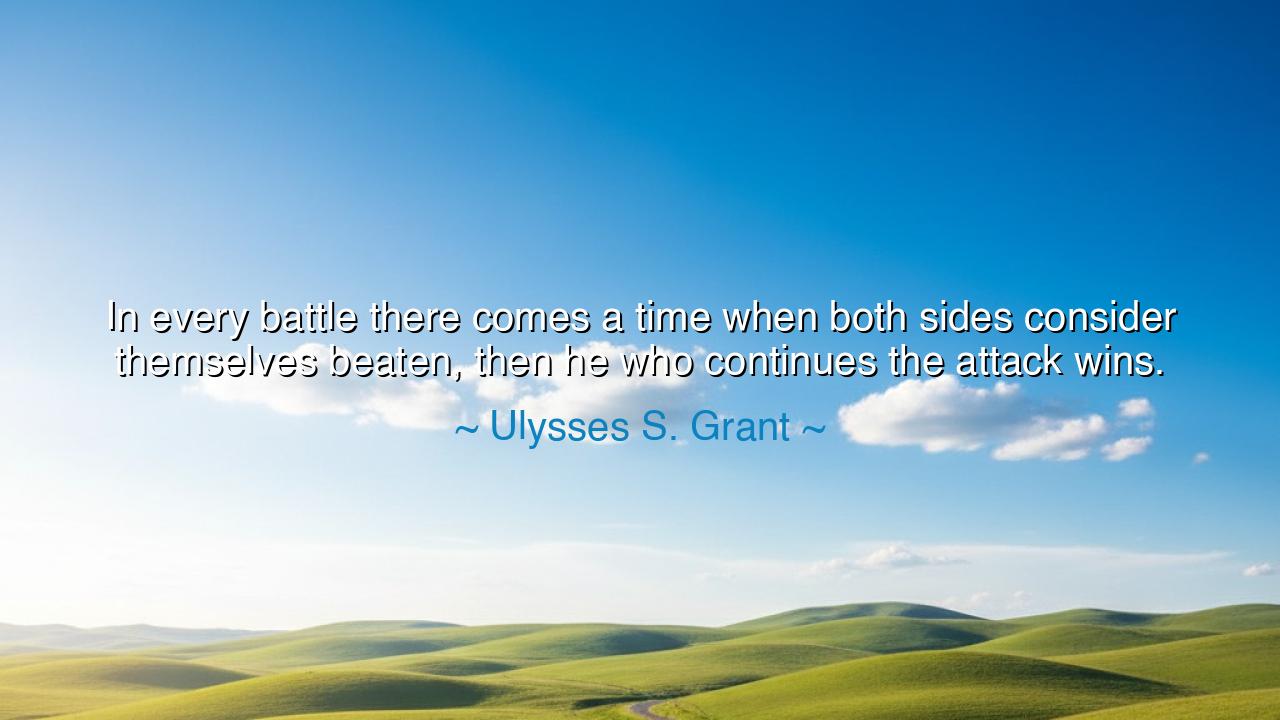
In every battle there comes a time when both sides consider
In every battle there comes a time when both sides consider themselves beaten, then he who continues the attack wins.






The words of Ulysses S. Grant—“In every battle there comes a time when both sides consider themselves beaten, then he who continues the attack wins.”—resound like the voice of one who knew both the terror and the triumph of war. Spoken by a general who led armies through the crucible of the American Civil War, they are not the musings of a theorist but the hard-earned wisdom of a commander who saw despair on the battlefield and learned that persistence is often the true key to victory. Grant knew that wars, like life itself, are not always won by brilliance or even strength, but by endurance—the iron will to keep moving when all others falter.
The ancients would have understood this truth deeply. The Spartans at Thermopylae fought until their last breath, embodying the idea that the side that refuses to yield may yet shape history, even in defeat. The Romans, too, built their empire not by winning every battle swiftly, but by never surrendering, by returning again and again until their enemies broke. Grant’s words carry the same eternal lesson: when both sides feel the weight of exhaustion, victory belongs to the one who presses forward, even through despair.
History gives us luminous examples. Consider the Battle of Gettysburg in 1863. Both Union and Confederate armies reeled under the weight of casualties. Each side bled, each side staggered, and both felt the crushing burden of defeat. But when Pickett’s Charge failed and the Union held its ground, it was not because they felt strong—it was because, though beaten in spirit, they endured long enough to break their enemy’s will. Grant’s wisdom springs from such moments: triumph is often born when both sides are convinced they cannot go on, yet one side dares to continue.
Beyond the battlefield, this truth echoes in the struggles of ordinary life. Thomas Edison, in his relentless pursuit of the electric light, failed hundreds of times. At moments, he too must have felt beaten, worn, and defeated. Yet he pressed forward, declaring, “I have not failed, I’ve just found 10,000 ways that won’t work.” His persistence transformed failure into triumph, proving that he who continues the attack wins, not only in war but in invention, in discovery, and in all human endeavor.
Beloved listener, the meaning is clear: despair visits both the victor and the vanquished. Weariness, doubt, and the sense of futility fall upon all who struggle long enough. What separates the victorious from the defeated is not freedom from despair, but the courage to act despite it. Grant’s words strip away the illusion that victory belongs only to the strongest or the most talented. Instead, it belongs to the steadfast, to the ones who rise one more time when all others have laid down.
The lesson for us is urgent: when life’s battles overwhelm you, when you feel that you can no longer endure, remember that your adversary too feels the same. The field of struggle is often leveled not by strength but by fatigue. If you can summon the courage to take one more step, to make one more attempt, to hold firm when your heart screams surrender—you may find that victory is already yours. Persistence, not perfection, conquers.
Practical wisdom demands this: when you stand in moments of exhaustion, do not trust only your feelings, for they lie. Instead, trust the discipline of persistence. Break down the battle into the next small action: one more breath, one more word, one more strike. Victory is often hidden just beyond the point of despair, waiting for the one who dares to go further. Remember, both sides may feel beaten, but the victor is the one who refuses to stay down.
So let Grant’s words echo like a battle cry across the centuries: “He who continues the attack wins.” Take them into your heart not only for wars of nations, but for the wars of the soul—struggles of hardship, dreams, and endurance. When you feel beaten, remember that the moment of despair may be the very threshold of triumph. Step forward, and you may yet find that you have already won.






AAdministratorAdministrator
Welcome, honored guests. Please leave a comment, we will respond soon